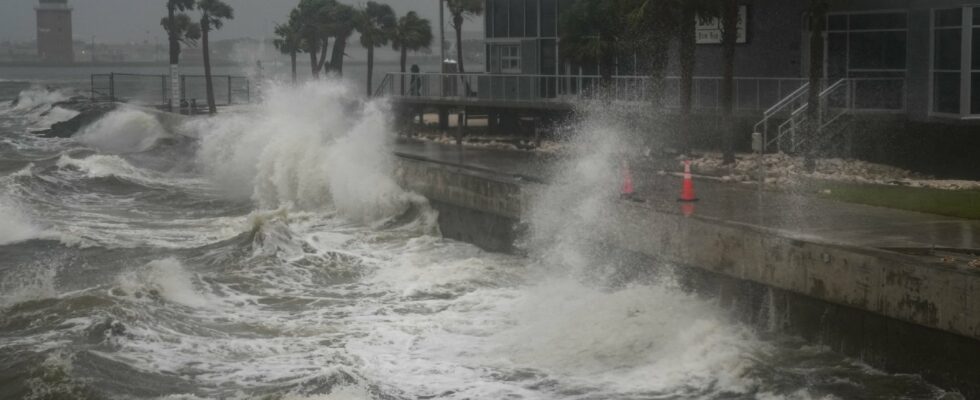Hurricane Milton, “extremely dangerous” according to the authorities, made landfall on the evening of Wednesday October 9 in Florida, sweeping the coast with violent winds, heavy rains and flooding the center of this peninsula in the southeast of the United States, two weeks after Helene’s devastating passage. Milton made landfall on the west coast of Florida “near Siesta Key in Sarasota County”, wrote the American Hurricane Center (NHC) in its 8:30 p.m. (2:30 a.m. French time) bulletin. Winds reaching 165 km/h were recorded in the evening, noted this source, warning of the risk of submersion. At least 1.6 million homes were deprived of power during the night from Wednesday to Thursday, according to the specialist site poweroutage.us.
Downgraded at the end of the day to category 3 (out of 5) but still considered “major” by the NHC, Milton is expected to be “one of the most destructive hurricanes in more than a century in Florida”, warned Joe Biden on Wednesday evening . Accompanied by “extreme winds” and heavy rains, Milton caused “sudden” flooding upon its arrival, specifies the NHC bulletin. “The storm is here. It is time for everyone to confine themselves (…) Stay indoors and do not take the road”, declared the governor of the state of Florida Ron DeSantis during a conference of press just before the hurricane arrives.
Airports at a standstill
Milton should cross Florida from west to east, according to the NHC, passing in particular near the city of Orlando, where the Disney World theme parks were closed at midday. Tampa and Sarasota airports are at a standstill. Tornadoes were also observed in the center and south of the state, according to the Weather Channel.
In the area where Milton made landfall, residents confined themselves upstream, at home or in designated centers. Before the hurricane arrived in Tampa, Randy Prior, 36, said he was “nervous”. “We are barely recovering” from Hurricane Helene, which left “the soils saturated” with water, he observed. In another large city on the west coast of the state, Fort Myers, Debbie Edwards pointed out that everyone was “anxious”. “It’s as if post-traumatic stress disorder had set in” after the passage of another devastating hurricane, Ian, two years ago. However, she decided not to leave.
“A question of life and death”
Two weeks after Hurricane Helene passed through the same area, which left at least 236 dead across the southeast of the United States, including at least 15 in Florida, Milton “is going to be a deadly and catastrophic storm” , warned Deanne Criswell, director of the federal natural disaster response agency (Fema). For several days, authorities have been urging residents of areas affected by evacuation orders to leave, assuring that it is a “matter of life and death”.
Florida, the third most populous state in the country which attracts many tourists, is used to hurricanes. But climate change, by warming the seas, makes their rapid intensification more likely and increases the risk of more powerful phenomena, according to scientists.
